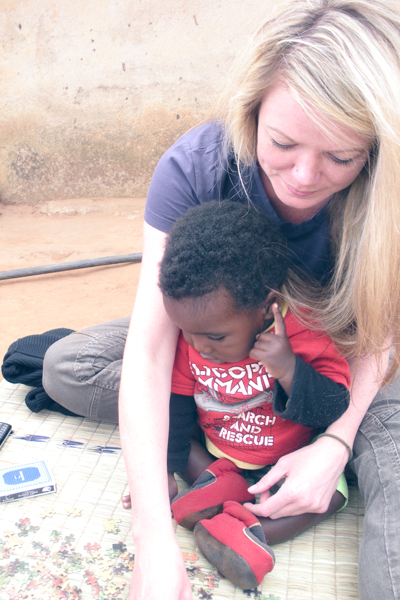10 Days in Swaziland
A Q&A with Alumna Annie Elble

Give Hope, Fight Poverty co-founder Annie Elble works on a puzzle with an orphan who is HIV-positive. (Photo provided by Annie Elble)
That first trip to Swaziland left an indelible mark.
It was 2008 when Annie Elble, a Purdue graduate student in the Master of Public Health program, traveled to the small country in southern Africa to scout areas where Purdue students could engage in service-learning projects or internships. She and two others visited rural clinics, city hospitals, schools, orphanages, child-headed households, and homes of AIDS patients on hospice care. They toured universities and talked with local African organizations that were fighting on the front lines in the war on AIDS.
Nearly 27 percent of the adult population is living with HIV/AIDS, giving Swaziland the highest HIV/AIDS rate in the world, according to The World Factbook. As a result, this country of only 1 million people has 120,000 orphaned and vulnerable children who suffer from malnutrition, poverty, abuse and illiteracy.
What Elble saw and experienced on that first visit changed her life. Three years later, she co-founded Give Hope, Fight Poverty, a nonprofit that facilitates service-learning programs in Swaziland for American students while educating and empowering orphaned and vulnerable children. Elble serves as executive director of the organization and co-founder Kait Mariutto is creative director.
What was that first trip to Swaziland like?
I quite possibly learned more about humanity and the purpose of life in that one week than in my previous 24 years combined.
We watched a traveling nurse, armed with only a stethoscope and some morphine, try to do whatever he could for an HIV+ woman who was raising four babies who would soon all be orphaned. We toured a pediatric clinic and watched moms cry over emaciated babies who appeared to have never eaten anything in their entire lives. We toured an underfunded and understaffed orphanage and were warned not to hold the babies because they had never experienced that before, and that when we left they would return to their existence on a dirty mattress on the cold floor missing our embrace.
That first trip to Swaziland was a lot, to say the least, for a couple of young girls. It was by far the most life-changing experience I've ever encountered. The situation (HIV/AIDS, poverty, hunger, illiteracy) was dire but the people were happy and hopeful. The children wake up singing and go to sleep dancing. I was hooked.
A lot of people go on service-learning trips but don't establish organizations like Give Hope, Fight Poverty. What inspired you to make this commitment?
We spent months getting to know these children on a personal level. We consistently volunteered at an HIV orphanage where the children had been burned by witch doctors trying to "cure them of AIDS." We had kids come over every day after school to play Connect 4 and have dance parties in our yard and pizza parties in our kitchen. We volunteered at a school that, at the time, only had one classroom and no resources but the children had dreams of becoming doctors and scientists.
We knew there were little things that could be done to make an enormous difference in this forgotten village, so we started blogging. We asked family and friends for financial support. Funds started coming in and orphans began attending school. Seeing the pride of an orphan who is wearing a school uniform for the first time and hearing their dreams for their future — and knowing that those dreams now are possible — that's what inspired me to keep trying to do whatever I could. There are 120,000 orphans in the tiny country. We have a lot of work to do!











